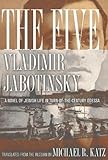The Five : A Novel of Jewish Life in Turn-of-the-Century Odessa / Vladimir Jabotinsky.
Material type: TextPublisher: Ithaca, NY : Cornell University Press, [2014]Copyright date: ©2014Description: 1 online resource (224 p.)Content type:
TextPublisher: Ithaca, NY : Cornell University Press, [2014]Copyright date: ©2014Description: 1 online resource (224 p.)Content type: - 9780801471636
- Jews -- Ukraine -- Odesa -- Fiction
- Fiction & Short Stories
- Literary Studies
- Soviet & East European History
- FICTION / Jewish
- Milgroms
- books on jewish russian culture
- books set in odessa
- elegaic paean
- fiction set in odessa
- fin-de-siècle
- historical Jewish fiction
- jewish historical fiction
- jewish literary fiction
- jewish literature
- jewish novel
- jewish studies
- literary fiction
- pyatero translation
- russian fiction
- russian jewish literature
- russian jewish novel
- soviet russian literature
- soviet union jewish history
- world fiction
- zionist literature
- 891.73/3
- PG3470.Z4 P513 2005eb
- online - DeGruyter
| Item type | Current library | Call number | URL | Status | Notes | Barcode | |
|---|---|---|---|---|---|---|---|
 eBook
eBook
|
Biblioteca "Angelicum" Pont. Univ. S.Tommaso d'Aquino Nuvola online | online - DeGruyter (Browse shelf(Opens below)) | Online access | Not for loan (Accesso limitato) | Accesso per gli utenti autorizzati / Access for authorized users | (dgr)9780801471636 |
Frontmatter -- Contents -- Translator’s Preface -- Introduction -- Principal Characters -- Instead of a Preface -- I. Youth -- II. Serezha -- III. In the Literary Circle -- IV. Around Marusya -- V. The World of Business -- VI. Lika -- VII. Marko -- VIII. My Porter -- IX. The Alien -- X. Along Deribasov Street -- XI. A Many-Sided Soul -- XII. The Arsenal on Moldavanka -- XIII. Something Like the Decameron -- XIV. Inserted Chapter, Not Intended for the Reader -- XV. Confession on Langeron -- XVI. Signor and Mademoiselle -- XVII. The Godseeker -- XVIII. Potemkin Day -- XIX. Potemkin Night -- XX. The Wrong Way -- XXI. Broad Jewish Natures -- XXII. One More Confession -- XXIII. Visiting Marusya -- XXIV. Mademoiselle and Signor -- XXV. Gomorrah -- XXVI. Something Bad -- XXVII. The End of Marusya -- XXVIII. The Beginning of Torik -- XXIX. L’envoi -- Selected Bibliography
restricted access online access with authorization star
http://purl.org/coar/access_right/c_16ec
"The beginning of this tale of bygone days in Odessa dates to the dawn of the twentieth century. At that time we used to refer to the first years of this period as the 'springtime,' meaning a social and political awakening. For my generation, these years also coincided with our own personal springtime, in the sense that we were all in our youthful twenties. And both of these springtimes, as well as the image of our carefree Black Sea capital with acacias growing along its steep banks, are interwoven in my memory with the story of one family in which there were five children: Marusya, Marko, Lika, Serezha, and Torik."—from The Five The Five is an captivating novel of the decadent fin-de-siècle written by Vladimir Jabotinsky (1880–1940), a controversial leader in the Zionist movement whose literary talents, until now, have largely gone unrecognized by Western readers. The author deftly paints a picture of Russia's decay and decline—a world permeated with sexuality, mystery, and intrigue. Michael R. Katz has crafted the first English-language translation of this important novel, which was written in Russian in 1935 and published a year later in Paris under the title Pyatero.The book is Jabotinsky's elegaic paean to the Odessa of his youth, a place that no longer exists. It tells the story of an upper-middle-class Jewish family, the Milgroms, at the turn of the century. It follows five siblings as they change, mature, and come to accept their places in a rapidly evolving world. With flashes of humor, Jabotinsky captures the ferment of the time as reflected in political, social, artistic, and spiritual developments. He depicts with nostalgia the excitement of life in old Odessa and comments poignantly on the failure of the dream of Jewish assimilation within the Russian empire.
Mode of access: Internet via World Wide Web.
In English.
Description based on online resource; title from PDF title page (publisher's Web site, viewed 26. Apr 2024)


